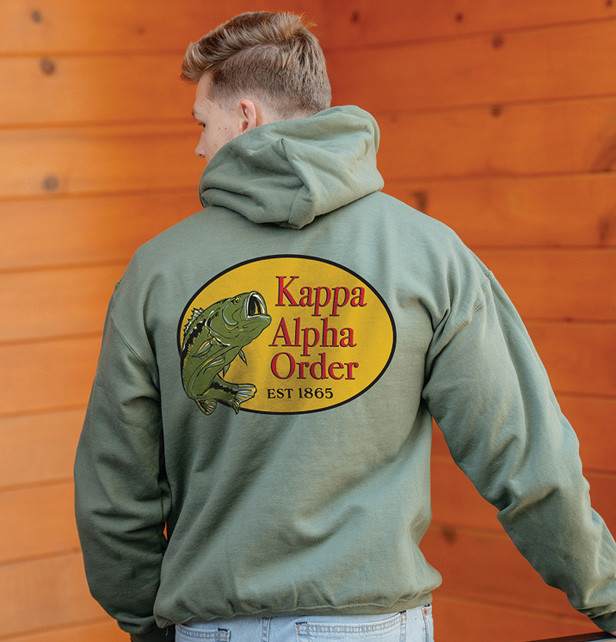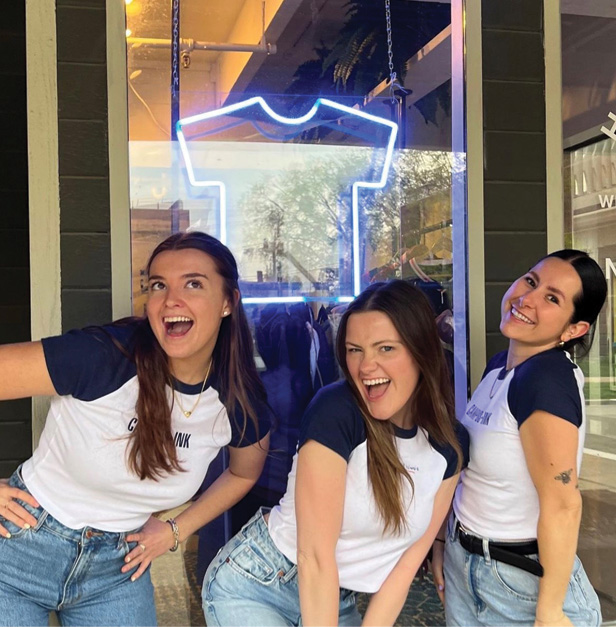May 01, 2024
Distributors Targeting Greek Market Turn to Students for Inspiration
Licensing barriers and inflationary pressure have created sales challenges, but for promo pros with strong connections to fraternities and sororities, opportunity still exists.
Little did the ancient Greeks know that their alphabet may be spread further today on the pockets of Comfort Colors T-shirts than in the texts of Homer or Sophocles.
Fraternities and sororities, each delineated by a couple or trio of Greek letters, have long been a mainstay of merchandise on college campuses and beyond. While logoed pocket tees and branded crewnecks have remained an emblem of Greek life’s outward-facing image, some promotional products distributors say the market for Greek merch has become twisted in a web of licensing barriers and organizational decline.

The Graphic Cow (asi/213007) has spent 30 years in the Greek life market, producing branded apparel for organizations like the Kappa Alpha fraternity.
A few decades ago, breaking into the college market wasn’t too difficult, distributors say. The Graphic Cow (asi/213007), for example, was born about 30 years ago, when two Clemson University alums began selling T-shirts for fraternity events, according to Andy Coyne, vice president of sales at the custom- apparel company.
“They found during their experiences in college that people would come to them for event T-shirts for their particular fraternity,” Coyne says. “They got out of college and said, ‘Hey man, I think we can make some money at this.’”
As the market evolved from making shirts for parties to outfitting the 1,000-plus Greek chapters nationwide, Coyne says universities, sororities and fraternities began “really cracking down” on licensing deals.
About 15 years ago, The Graphic Cow was one of the first distributors to get those licenses, he says. The South Carolina-based company is currently licensed with about 125 universities and nearly all Greek organizations, according to Coyne.
Today, the market for fraternity and sorority merchandise has become “incredibly competitive,” Coyne shares. He points to the large number of distributors involved and the upper hand wielded by licensing bodies.
“The universities and the Greek organizations have now capped it,” Coyne says. “They’ve basically said, ‘We’ve got plenty of apparel providers that are licensed. We don’t want anymore.’”
A Challenging Market
The complexities and challenges of selling Greek merch are leading some distributors to exit the market completely. That’s the situation Illinois-based UpMerch (asi/247885) is currently in, according to CEO Kevin Alsterda. With the annual license for a single chapter amounting to approximately $100 and annual fees increasing from about 8.5% to over 10% in recent years, the economics no longer make sense – especially post-COVID, he adds.
“When campuses got back to normal, we tried to move back to where we were pre-COVID,” Alsterda says. “What we learned is the organizations are much smaller than they were pre-COVID, and inflation is crazy in our industry. Things are 25%, 30% more than they were pre-COVID, and college students have a very limited budget.”

UpMerch (asi/247885) created merchandise for Greek organizations like Alpha Xi Delta in the past, but CEO Kevin Alsterda says he recently made the decision to exit the market.
Alsterda points, in part, to the decreasing size of individual chapters. As the number of fraternity and sorority initiates nationwide has declined in the wake of the “Abolish Greek Life Movement” and college students face financial pressure from inflation and rising tuition, Alsterda says orders have decreased in size.
Indeed, cost is the number-one consideration when ordering merch for Tanner Zagrodnik, a Georgia Tech student who serves as “T-shirt chair” for his fraternity, Phi Kappa Theta. Although his chapter’s size hasn’t dwindled despite a decline in the number of prospective members schoolwide, Zagrodnik says the fraternity’s funds allotted for merchandise per member remains fixed. “It’s not a huge part of our budget to spend money on merch,” he adds.
With sales peaking around fall recruitment, or “rush,” Alsterda estimates that chapters used to order five-plus items each per 250 members for rush. Now, he says, he’s looking at order quantities about half the size of previous ones.
“Maybe their organization hasn’t shrunk that much,” Alsterda says. “But the number of members that are willing to pay for the increased cost has gone down.”
Before 2020, the campus segment (mainly sororities and fraternities) made up about 80% of UpMerch’s sales, according to Alsterda. In 2023, it was 30%. This year, it will be 15% to 20%. Next year, he says he hopes to zero out that percentage.
“We’re a small business, and you can only focus your energy on so many things,” Alsterda says.
Studying the Student
A larger distributor in the space, Campus Ink bases its marketing and sales model around its “student designer” ambassadors, according to Program Coordinator Haley Allen. Joining the company as a student designer from Illinois State’s chapter of Alpha Gamma Delta, Allen says the program leverages students’ physical and social proximity to chapters, allowing them to design and market merchandise.
The Illinois-based apparel decorator, which has also made a concerted push into Name, Image and Likeness merchandise for student athletes, maintains about 250 student designers across 50 campuses nationwide, according to Allen. Campus ambassadors receive 10% commission on orders.

Campus Ink representatives wear branded T-shirts at a promotional event for the University of Illinois at Urbana-Champaign.
“They really are our best advocates because they’re on their campuses and marketing to their sororities and fraternities and different organizations on campus,” Allen says. “They’re our best marketers, and how we sell a lot of our apparel is through them. They’re the ones putting in the work and building those relationships with customers.”
Also starting with her company while still in college, Madyson Mitchell is the marketing manager for The Graphic Cow. A 2021 graduate of Clemson and member of Delta Delta Delta, Mitchell says the distributor relies on current college students – she listed the company’s current marketing intern, a Clemson student, as an example – to keep up with trends.
As a “very face-to-face, personal company,” The Graphic Cow also employs pop-up shops and giveaways to connect with students, Mitchell says. The company launched its “T-Shirt Hero” campaign this year, sending chapter-merchandise chairpersons T-shirts with sample designs and a superhero cape to make ordering merch fun.
“This way, they’re encouraged to reach out for a sample box that we send to them to get this cool swag kit,” Mitchell says. “On our end, we reach out – ‘Is this still your right address? Is this person still the T-shirt chair?’”
Given the high churn of chapter leadership at four-year universities, distributors say they leverage existing relationships and marketing to maintain contact with T-shirt chairs year after year. This makes having campus representatives attuned to chapter dynamics even more important, according to Allen.
Indeed, distributors agree that a major key to success in the Greek space is working directly with students. Coyne, of The Graphic Cow, notes that his company’s main issue is figuring out what college kids currently want.
“It’s imperative that you have someone on staff that knows the market,” Coyne says. “The market changes so quickly that even hiring someone who was part of that Greek system three years ago can be nearly irrelevant to what young adults want in this day and age. It’s that constant struggle of trying to keep up with trends.”
Whether as interns or on-campus representatives, this means distributors often bring students onboard in roles like marketing experts, merchandise designers and trend identifiers.
“We really just rely on our students and try to keep them in the loop and keep them on track of staying organized for what events they need to be planning for,” Allen says.
Aside from merchandise becoming “a little bit more expensive” due to inflation, the space is still profitable for Campus Ink, Allen adds. “The Greek world definitely is changing,” she says, “but our students haven’t had too much of a problem continuing to sell and do their thing.”
